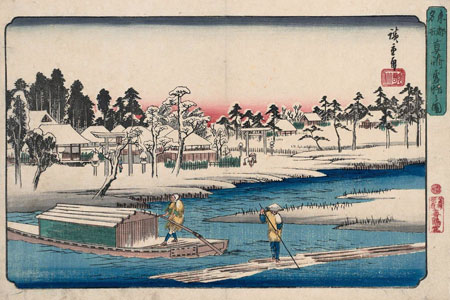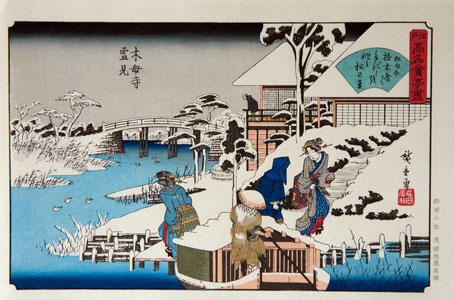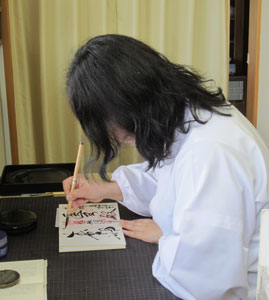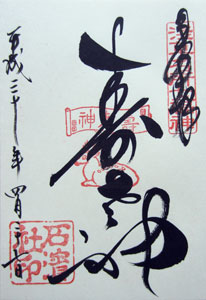
|
|

|
Hokusai - Ehon Sumida Gawa - Prints 3-10 and 3-11

|
|

|
This is a winter scene at the shrine of Inari Myōjin (稲荷明神) in Massaki (真先) located just north of Hashiba on the west bank of the river. Near this shrine there are several teahouses, famous for their dish known as dengaku (田楽), small squares of skewered tofu brushed with a sweet miso sauce and grilled over charcoal. Between the trees on the far away bank in print 3-10 we see the roof of Mokuboji temple (木母寺).
Here is a winter view of Inari Myōjin shrine as seen from the river (click to enlarge):

|
Clear Weather after Snow at Massaki |
The shrine is on the left. The small elevated building visible between the two torii gates is one of the teahouses with a view on the river serving dengaku. In the foreground we see a log raft being poled down the river by a logger (known as a kawanami, 川波, literally “waves on a river”), wearing a straw cape against the winter cold and deftly manipulating the logs with his long pole.
In the next winter scene two well-dressed ladies and their assistent are disembarking from a yanebune at the grounds of the Mokuboji temple located on the other bank of the river (click to enlarge):

|
Viewing the Snow at Mokuboji Temple: the Uekiya restaurant |
They are on their way to the Uehan restaurant, which is short for the name of its owner, Uekiya Hanemon. It is the most famous of several restaurants located in the vicinity of the temple. It specializes in dishes of taro (a type of vegetable) and clams, and is much prized among stylish residents of late Edo. Note again the plovers on the surface of what was then known as the Uchigawa inlet from the Sumida river.
Mokuboji temple still exists today, and here are two of the pictures I took of this Buddhist temple while visiting Japan in October 2019 (click to enlarge):
.jpg)
|
.jpg)
|
| Current-day Mokuboji temple | Current-day Mokuboji temple (up-close) |
In 1926 the Inari Myōjin shrine (or Inari jinja shrine as it has also been called) in Massaki was merged with the Ishihama-jinja shrine located in the same district. These are some pictures I took in 2018 of Ishihama shrine located in Arakawa, Tokyo, as well as the stamps and calligraphy I obtained from a miko (i.e., shrine maiden) in my goshuinchō temple stamp book (click to enlarge):
.jpg)
|

|
.jpg)
|
| Ishihama-jinja shrine | Shrine maiden writing calligraphy in my goshuinchō at Ishihama-jinja shrine | Ishihama-jinja shrine from up-close |

|
| Ishihama-jinja shrine calligraphy and stamps in my goshuinchō |
The kanji in the calligraphy in the left column of the page in my goshuinchō are 平成三十年四月二十七日. This translates into Heisei 30, the 4th month, the 27th day, and thus in 2018, April 27: the date of my visit to the shrine.